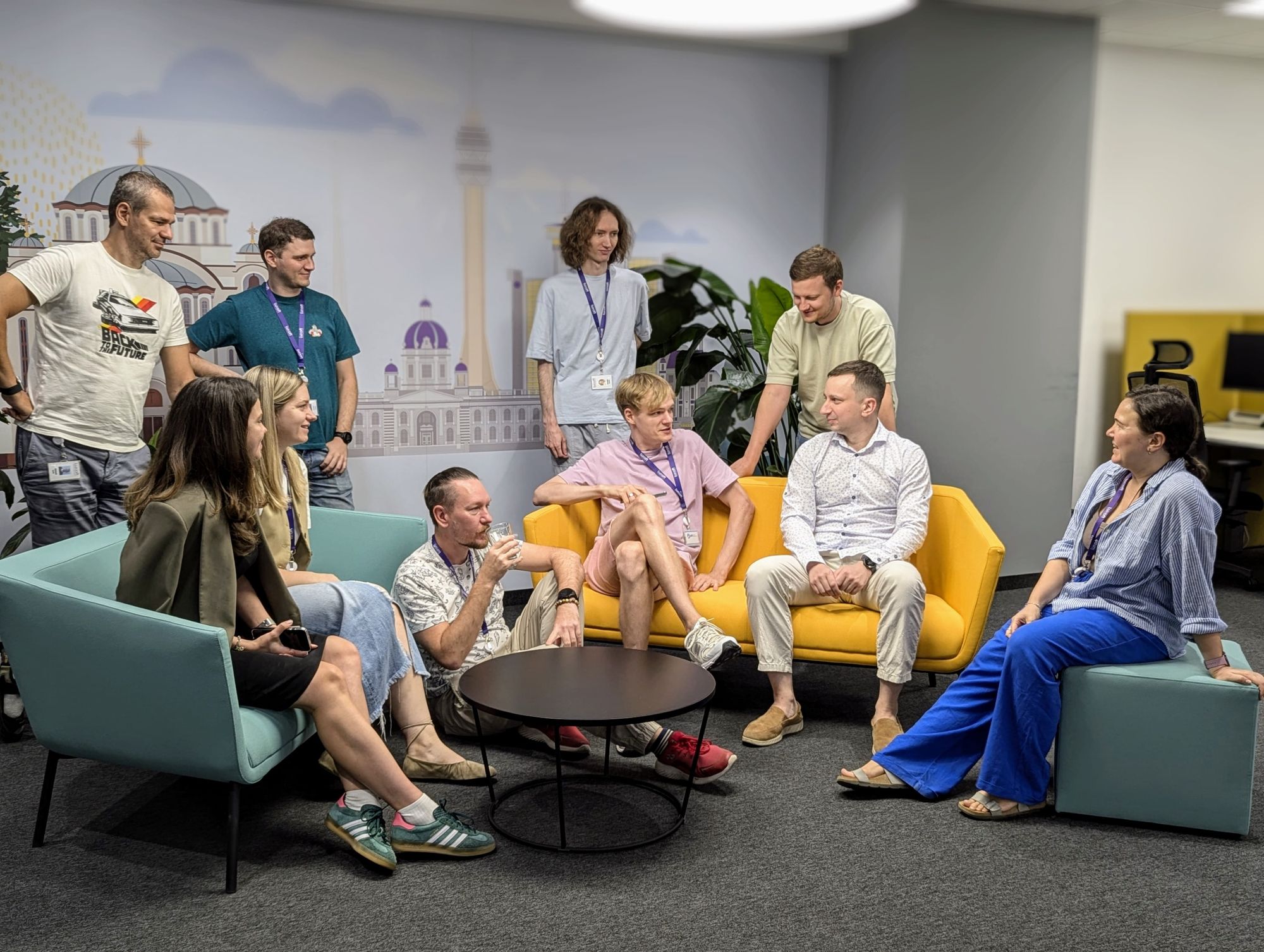
Face-to-face collaboration: How office work impacts employee well-being
Flexibility is one of the biggest draws of remote work. According to Statista, for 22% of respondents, the best part of it is choosing when they work, and for 13%, the ability to choose where they live. However, remote work does have its downsides. Twenty-one percent of respondents say the biggest problem is “staying home too often,” which can cause feelings of isolation and loneliness. One team at DXC Luxoft discovered that coming to the office has kept them engaged.
We talked to Olga Rubtsova, the operations program manager, who turned lemons into lemonade when her team was required by the client to work from the office. She managed to create a group known throughout the company for its high performance and friendships.
The team consists of highly skilled IT specialists who relocated to Serbia from different countries.

Managing a relocated team
Moving has a huge impact on your personal and work life. Here are three principles we use to keep things flowing smoothly:
1.Respect for everyone's rhythm
Our team has a flexible schedule so that everyone works during their most productive hours. For some that’s the evening, while others start at 8 a.m. But most of us head home at 5 or 6 p.m., leaving plenty of time for personal matters.
2. Traditions
Teams have their own traditions, and we do, too. For example, our daily lunch is at 1 p.m. and if other colleagues don’t see us in the kitchen then, they text us: “Why aren’t you having lunch? Is something wrong?” Some people joke that they can set their watches based on when we eat.

3. Shared activities
It’s important for people who have moved to a new country to avoid isolation. One way we do that is by meeting outside of work. We’ve hiked together, participated in a quiz night, and even volunteered at an animal shelter.

“Once we were on a hike along the Tara. We walked 15 kilometers and got super tired and soaked from a downpour. But the day ended beautifully: We played board games by the fireplace, had tea and laughed a lot. It was great.” - Alina, IT engineer

Benefits of working from the office
Some might say that it’s a bad thing when you’re required to work from the office, but our team has found that it has quite a few benefits.
- Work-life balance
Working from home can make it easier to juggle chores and errands, but it often leads to longer workdays. The office, on the other hand, helps you focus: You arrive, tackle tasks, discuss issues with your colleagues promptly and then leave work behind to enjoy your personal time.
“We have a fun and interesting team, and it's boring to work at home without them. The office really helps separate work and home. It's easier to maintain a work-life balance.” - Victoria, lead IT engineer

2. Constant knowledge sharing
Being in the office allows us to discuss the latest developments, sparking ideas for new tools and workflow improvements that benefit both the company and our careers.
“We call this rapid exchange of knowledge “pollination.” When you're in an office environment, learning happens almost by osmosis.” - Nikita, senior IT engineer
3. Newcomers adapt faster
Our team has high professional expectations. It’s hard to find ready-made specialists who come in with just the right technical backgrounds. Newcomers often need on-the-job training. Our friendly atmosphere helps new joiners quickly learn our techniques and standards all while gaining insights from experienced colleagues and integrating into the team.
4. The team works more efficiently
In the office, there are fewer distractions, which helps us focus on one task at a time. When you see everyone else actively engaged, it’s energizing and motivating.
5. Colleagues can lend a hand in real time
In the office, it's easier to notice when someone looks tired or their performance slips. My role is to notice this in time, and help them address the issue whether that’s taking a vacation, or maybe helping them find external support.

How we deal with disagreements within the team
Of course, when people spend a lot of time together, there can be frictions. We're no exception. For example, our air-conditioning wars, when one person would be too hot and another too cold, didn't end until we approached the problem systematically.
- We listened to each person’s opinion
- Together, we decided what the AC could be set to
- We rearranged our seating based on who preferred being near or further from the air conditioner
Creating a supportive work environment
My main goal is to create a comfortable environment where employees are as productive as possible.
“If I were assembling a team to save the world, Olga would oversee morale. Thanks to her experience, the team has a positive atmosphere where we can realize our potential, where we’re free in our thoughts, actions, and discussions, but also understand the feelings of our colleagues.” - Nikita, senior IT engineer
I have an atypical career path for a program manager. Generally, people say it’s better for an IT manager to have a technical background, but I came from HR. My career proves that developing soft skills can lead to success in any field. People management is a major part of my duties, because the most important goal of a successful tech company is to make sure that hired talented people can work comfortably and develop as professionals.

“Olga knows how to build a rapport with others, which is usually more difficult for people from technical fields. This allows us to maintain a friendly atmosphere and we can see that she really cares about us.” - Victoria, lead IT engineer
Of course, the office format is not for everyone. For some, the best choice is hybrid or remote. Distributed teams need processes that allow for quality integration regardless of where people are. Shared activities, visualization, gamification, turning on cameras at meetings are great but in my view, there’s no substitute for live interaction.


